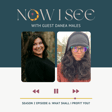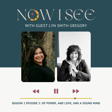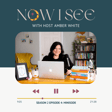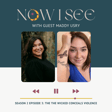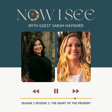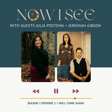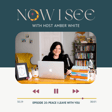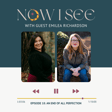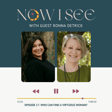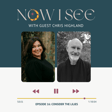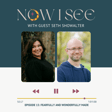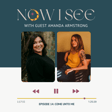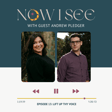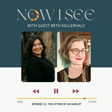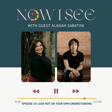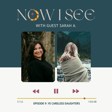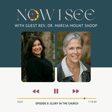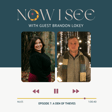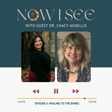Become a Creator today!Start creating today - Share your story with the world!
Start for free
00:00:00
00:00:01

Our Father Which Art in Heaven: God and the Silent Father Figure with Chrissy Holm
Whether you grew up in or around Christianity or not, you’re likely familiar with the idea of God as “The Father.” It’s hard to miss. But for many of us, it’s an idea that’s difficult to connect with.
In this episode, I’m talking with Chrissy Holm, host of the Stirred by Words podcast and author of the upcoming book Finding Sunlight: A Coming of Age Memoir About Love Within the Wreckage of Purity Culture. Together, we examine the impact of God as a silent father figure and the ways we’re unlearning the limited ways we were taught to see God.
Resources from Chrissy
- Visit Chrissy’s Website
- Listen to Stirred by Words
- Learn More About Finding Sunlight
- Follow Chrissy on Instagram
Links
Transcript
Introduction to Podcast Themes
00:00:01
Speaker
I was lost in utter darkness I was trapped in toxic shame I was bound by my religion Till I chose to break away
00:00:24
Speaker
Now I'm finding my true colors For the first time I feel free Now I'm learning self compassion And as I heal I'm finding peace
00:00:51
Speaker
Welcome to Now I See, eye-opening stories from the formerly faithful. I'm your host, Amber White, and here, me and my guests share our experiences in loving and leaving rigid faith systems. Together, we shine a light on the dark corners of these institutions and share the joys of rebuilding life on our own terms. I promise you'll leave inspired, even if you are a little teary-eyed.
00:01:23
Speaker
Hi, and welcome back to Now I See. I'm your host, Amber White, and today's conversation is one I've been mulling over for a few weeks now.
Meet Chrissy Holm
00:01:34
Speaker
I'm talking with Chrissy Holm, host of the podcast Stirred by Words, which I will be a guest on this fall, and author of the upcoming book Finding Sunlight.
00:01:45
Speaker
a coming-of-age memoir about love within the wreckage of purity culture. Chrissy has such a lovely presence, and I'm so glad we were introduced by our podcast studio.
Exploring Divine Gender Roles
00:01:58
Speaker
When I invite a guest to be on the show, I give them the option to tell me what they want the theme to be. And I was very intrigued when Chrissy mentioned God as a silent father figure. Thinking of God as a father figure wasn't something that I was ever able to connect with very well. I remember trying really hard in my middle school and high school years to see God that way, but it wasn't something that resonated.
00:02:25
Speaker
My parents were divorced, with my dad living several states away, and I was a woman. There wasn't really much for me to relate to. If you've listened to this podcast before, you're likely aware that I'm not fond of gendering the divine.
00:02:40
Speaker
According to the Bible, most churches have and use and teach. God created all of us in the image of God and then decided to go all in on one specific archetype out of all of those, leaving anyone who doesn't carry the title man or father out of a chance to see the image of God in themselves.
00:03:00
Speaker
What an interesting way to disenfranchise over half a population. What an interesting way to make more people than not feel completely disconnected from their creator. It's almost like doing so concentrates power into the hands of people who benefit from it. It's almost like it allows them to use anyone outside of that image to do their bidding under the guise of providing access to God. Weird.
00:03:28
Speaker
Gendering aside though, I struggle with the parental title a bit as well. I mean, I get it, creator and all, but what sort of parent goes silent after saying a few cryptic words a few thousand years before you're born and then demands so much praise and perfection that you constantly feel guilty that you aren't giving enough because you're told you never can and never will, but are still expected to?
00:03:56
Speaker
And what kind of parent tells their child that they're lucky to be loved and cared for by them because something that was passed down through generations and is entirely out of the child's control makes them imperfect and therefore unworthy to be in their presence unless they say a very specific sentence in a very specific way and really mean it?
00:04:19
Speaker
We would call that child abuse because it is. And yet so many of us learned that this is who God is and how God works. And we're then told this was the perfect example of a loving father. It's a shame.
00:04:35
Speaker
I won't say too much more and spoil this awesome conversation, so just a quick reminder that there are some helpful links in the show notes for Chrissy's book, her lovely podcast, and other resources that I've curated for you so far. Okay, let's get into the episode.
Chrissy's Church and Homeschooling Background
00:05:02
Speaker
Hi Chrissy, I am so grateful you're here today. I've had the best time getting to know you in this process of getting to recording and talking about our topic and I just think you're a wonderful ray of sunshine human being and I appreciate you being here today.
00:05:20
Speaker
Thank you so much, Amber. I really appreciate you letting me be on the show and share part of my story. And I'm really excited to get to know you more even throughout this interview. And yeah, I just really appreciate your time and energy today.
00:05:37
Speaker
Oh, thanks. It's a gift to have you here. So for our listeners, if you would please set the scene of your religious experience, maybe what it was like in your childhood, that sort of thing, just so they know where you're coming from and what your experience was.
00:05:53
Speaker
Absolutely. So I started going to church when I was about four or five years old. So I was really young. My parents brought us to this one. When I say us, it was me, my brother, and my two sisters. So a collection of us. But at the time, I didn't realize it was an evangelical Baptist church. And I was just going to church with my family. And I remember those early days, like there's a lot of community and I had met some good friends. One of
00:06:19
Speaker
that I'm still friends with today. But towards the end of like first grade, when I was in first grade, my dad told my siblings and I that we're actually going to be homeschooled at that church, which was a really big turning point for our family. And, you know, as the years went on, my dad was a deacon, a music director, a church treasurer, like he was very involved in the church. So naturally we were.
00:06:44
Speaker
Yeah, but that's kind of where I started getting into religion and church. It was just baked in for me. Yeah. So when you say homeschooled at church, is that like a homeschool pod that met at the church? Yeah. What was that like? So I was homeschooled from second to fourth grade, which I know we'll talk about probably later. It was kind of like a pod. It was basically a few of the different families
00:07:11
Speaker
had said, I think it's time to be taking our kids out of the public school because they're teaching evolution, they're teaching sex education, that kind of stuff. It was really started by the parents and they did some research and it was, we called it the homeschool co-op.
00:07:31
Speaker
Essentially. Yeah. Okay. That makes sense. That's really interesting. Those are common things that I hear a lot of people who are homeschooled. They didn't want their kids being taught evolution, sex education, band books, those sorts of things. Yes. So it's interesting to me. It always comes back to this element of control, right?
00:07:51
Speaker
How do I control every single thing that happens so that it only fits into this experience and pushes this experience along and limiting that outside influence that might potentially lead to questions, right?
00:08:11
Speaker
which they call being led astray, right? You remember that term? I've got goosebumps. Thank you. It almost always comes back to that. And I think that's really interesting. So you guys were heavily involved, it sounds like, more than your average church attendee.
00:08:30
Speaker
Yes. Yeah. So we were homeschooled. Well, it was interesting because our homeschool was Tuesday through Thursday. Mondays and Wednesdays we had off. So that was kind of nice. We had some more free time. But so Tuesdays through Thursdays were at homeschool. Wednesday nights were at church. Saturdays we'd do like events for the church, like a Valentine's Day dinner, that kind of thing. And then Sunday, obviously morning service. And then we'd go home for lunch and then we'd come back for evening service.
00:08:58
Speaker
It's a lot of church time. I remember that very well. Just your whole life is centered around making sure you're ready to go to church. You're ready for night church after morning church. You're ready for that VBS week. You're ready for revival. You're ready for... It's a lot. It really does take up a huge portion of your life, which I think is okay, right? There are a lot of things that you can get involved in that will take up a chunk of your life.
00:09:26
Speaker
And I don't criticize anyone for wanting to commit themselves to a group that's good to them in that way. But where the issue I take with it is when it's the pressure to do it, because if you don't, you're bad. If you don't participate, you're not committed to God. If you aren't doing the Valentine's Day dinner, you're not a great servant-hearted person. That's to me where I think a lot of the issues come in.
00:09:53
Speaker
And where I start to see religion cross into cult territory. Absolutely. Like they're perpetuating that like shame of if you're not doing this, then you're going to go to hell or you're like you said, and you're not serving the Lord. Yeah. Yeah. It goes back to that control piece, right? Yes. Yes. The control just kind of gets passed down the umbrella. Mm hmm. Mm hmm.
00:10:18
Speaker
Yeah, that umbrella. I was just watching that shiny happy people. I know, which I'm sure that we could go down a rabbit hole on that. But when they're talking about that umbrella of the husband, wife, and then the children, I'm 90% sure my dad showed me that when we were younger. So it's like that was something that we were taught is we respect and we are there for the father figure, essentially.
00:10:45
Speaker
Yeah, that father figure thing gets very real very quickly because it's interesting like you got God as father right on that top umbrella. Yep. And then your pastor as your spiritual father. Yep.
00:11:01
Speaker
and then your dad is your father-father, and then mom who is kind of your authority but is actually just your dad's authority passed through her, and then there's you and you have nothing. You don't even have authority over yourself. I think it paints a really interesting picture of what a father figure is and isn't.
00:11:23
Speaker
Absolutely. Yeah. I know I have like this very vivid memory of me standing in the church hallway with my dad. I'm not entirely sure how old I was, maybe like six, seven, eight, I don't know. But I remember that I would ask him, I'm like, because we were talking about like, what's the most important thing in your life? Like who do you make a priority? And he always said, God is number one. Then it's your wife and children. Then it's you. Like you come beyond that.
00:11:54
Speaker
Yeah, yeah. That's so interesting too because you come last, but you're also the leader of the household.
00:12:00
Speaker
if you're a father. Those are difficult things to hold in the same hand or even in the same two hands, like on the body. I think there's a disservice done to women in these cultures for sure, but they come at the expense of also doing damage to, I think, men's psyche and their emotional state.
Father Figures and Family Dynamics
00:12:22
Speaker
It's sad to me to see. I think it gets overlooked more often because men aren't going to speak up about their feelings as much.
00:12:31
Speaker
Absolutely yeah I think looking back at why we joined the church I think part of it was my dad but I think it's because I feel like he was looking for something and he didn't like know what so his dad left like his biological father left.
00:12:47
Speaker
before he even knew him, like that kind of thing. So I think he was trying to look for that like father figure as well. And sometimes I think he felt like he was finding himself in church. And of course, I can't speak for my dad, but this is just how I've been able to process it is like he found himself then at church, which obviously had an impact on us as kids.
00:13:08
Speaker
Yeah. When you think about the way you experienced fatherhood with your dad and then the idea that God is your heavenly father, how did what you learned from your experiences with your dad translate into that relationship with God? How did it affect it? Yeah, I think that's a good question. I think some of it is like kind of that control that we were talking about, but also just like that fear was a big aspect of it. It's like you have to
00:13:34
Speaker
Not fear your dad, but he knows what's right, so you have to follow what he says. For example, my dad would say, if I tell you to jump, you don't say why you say how high, kind of a thing. And that's how I interpreted how God would look at me as well.
00:13:55
Speaker
You don't ask me questions of why you say, like, what can I do to serve you, Lord? So I think both of those kind of went hand in hand for me. Yeah. The idea that you're like an empty vessel that just gets filled up with whatever somebody tells you to do is pretty real. Did you ever hear the phrase growing up that quickly, sweetly and completely with obedience?
00:14:19
Speaker
obedience for sure. I'm trying to remember the first part, but obedience was yeah, we heard that huge one. Yeah. Yeah. I remember hearing all the time was like the quickly sweetly and completely that's how you obey. And so if you don't do it quickly, if you don't do it with a really good attitude and joy in your heart, and if you don't do it beyond the idea of like
00:14:40
Speaker
done like it should be like as perfect as possible like then you didn't actually obey yes okay yes you just tried not to get in trouble and that's not good enough it really sets you up for a really weird work life i gotta tell oh my god yes holy yeah exactly that is that is so funny because that is yes you just nailed everything that i experienced in my day-to-day
00:15:08
Speaker
It's probably because I also experience it one day a day. We have that in common. I have found that I am very quick to undercut my own experience, to undercut my own skill set and to just undervalue my experience and abilities and all of that and just really
00:15:28
Speaker
It affects you in your day to day, everything you do. It really does. It comes up. Yeah, you think it's just like, oh, I just grew up with it and I'm fine and everything is fine and dandy or whatever. But it really does impact everything that you do. It does. Yeah. Well, then thinking about then the relationship with God that comes off of that idea of obedience to your parents, that obedience to God. But God is silent. So you have a Bible that sometimes addresses issues and sometimes doesn't.
00:15:58
Speaker
not everything is addressed that comes up in life. Yeah. I mean, I think to like play off of that a little bit too, like something that I've worked with in therapy a lot is I've got this like right and wrong, black and white kind of thinking. And it's really something that I've been trying to work on is thinking more of those shades of gray and like not everything is a right or wrong type thing. Yeah. I have been coming face to face with my own rigidity a lot lately. Yeah.
00:16:25
Speaker
Yeah. Oh, it really isn't that boxed in. It really isn't that intense. It's just, it's okay. Exactly. Nobody cares about this as much as you do right now. Yep. Most folks aren't even good enough. And everything's fine. And it's interesting how that has held over all this time. How long ago did you leave your religion?
00:16:49
Speaker
Yeah, so I would say I was about in like 10th grade. It was right around the time that my parents got divorced, which is a whole thing because since my dad was so strict religious, it kind of rocked the boat. But I left a little bit before that. I had been dating somebody who was actually atheist and he kept saying questions and I'm like,
00:17:13
Speaker
Wow, yeah, that's interesting. I never thought about it that way and it really got me thinking a lot more. I had been going to church with a friend and her and her parents were picking me up and we were just going and I felt myself sitting there and I'm like, I'm not happy here. I don't feel good. I feel like you guys are saying things that I don't believe in or agree with and why am I still going?
00:17:38
Speaker
So, writing around 10th grade is when I'm like, okay, I'm done. I'm done going 10th, 11th grade, maybe. Yeah. That's about the same time as my partner left church. And he was just like, I don't think this is right. I don't think this is good. Yeah. I was about 19 when I went to Bible college, 18 or 19 when I went to Bible college. And that's when it all started for me.
00:17:58
Speaker
Absolutely. Yeah. And when we were preparing for this episode, you know, we were talking about like Pensacola Christian College. Yep. I mean, I remember sitting in those, I was sitting in that church environment right around 10th, 11th grade. And they're like, Oh, you got to go to college. And they kept giving us pamphlets for that school. And I'm like, Oh, I don't know. This doesn't feel right. Yeah. The recruiters for those colleges work hard.
00:18:23
Speaker
Absolutely. The devil works hard, but Bible college recruiters work harder. It's so true. They're everywhere. Everywhere. And they have a story to tell. Oh yeah.
00:18:38
Speaker
all of them. It's unbelievable. Oh, yeah, yeah, it's usually that's, that's a critical time that going into college age, it's a it's around the time in development when you're really starting to separate yourself from your parents anyway in preparation for adulthood. And so I think it just sometimes gets wound up in that
00:18:58
Speaker
And that separation from parents thing gets interesting because you've been living under this strict authority for so long. And then if you're like me and you just kind of like leave and then you're out on your own, like it is shocking.
00:19:12
Speaker
Yeah, and it's you're not prepared. Exactly. It rocked my world because it was like you're saying it was so like, scriptive, I guess. Like, this is what you do. And then when I lost that, or I didn't have that example for me, you know, that example was shattered, then I didn't know what to do, what to follow.
00:19:36
Speaker
I felt like that was so ingrained in who I started to become is like, you just follow what God and your father says, essentially. Yep. I found myself so surprised by how fluid the world is, right? By the spectrum of people's personalities, by the various experiences that they had that I couldn't have even imagined at that point.
00:20:00
Speaker
meeting people who had traveled the world, not just for missions, but for learning and for fun and for who knew about other religions that I'd either never heard of or knew very little about, only enough to say they're wrong, right? They're not like mine, so they're wrong. It's a really weird way to learn about something, not an effective way to learn about something. No, absolutely not. It was very overwhelming.
00:20:27
Speaker
that authority umbrella is gone too. And all of a sudden you're your own authority, but you have no idea who you are. Yes. You have no idea what you want. You have no idea what people can be like and how to protect yourself if you need to, or even what a good, healthy connection looks like because you're just so ingrained to follow a mold and an authoritarian setup.
00:20:53
Speaker
Exactly. You're just an empty vessel that has no direction in life now. That's exactly right. And I think too, but like going up that umbrella to God, I want to go back to that silent father figure thing.
Navigating God's Will and Personal Agency
00:21:07
Speaker
The idea that God talks to people, you hear that sometimes. God speaks to us through His word and all of that, but again, it doesn't touch on every situation. How do you choose a career that's God's will if it's not directly written in the Bible that you should go do this career because you're this kind of person? There's no prescription for that, right? It creates this barrier between your ability to experience yourself and learn about yourself because you have
00:21:36
Speaker
to know everything that's the will of this silent father figure. Like how can you understand what you need to do if you're not getting any feedback? Not getting any feedback and that's okay. Yeah. And that's your problem. Right? But yet you also don't have the authority to think and ask questions and ask why. No, that is a toxic relationship. If I looked at my partner right now,
00:22:03
Speaker
and asked for direction on something. What do you want me to do with your laundry, even something small, right? Any silenced out of it, but then expected me to know?
00:22:14
Speaker
based on a vibe? No, absolutely not. Something a little bit more concrete, something clear? Like what? Especially if you're going to make it as serious as they make it, right? Like this is, this is everything. This is, this is your whole life and then okay. It's like your death. Like, yeah, yeah. Yeah. So I'm curious how
00:22:38
Speaker
that has shown up for you in your relationships? Will they be romantic or, you know, even just platonic friendships? How has that idea shown up for you? Yeah, I think it's tough because I feel like in the relationships that I've been with men, it's been, I just kind of have to listen to what they are saying. And I feel like they know the right way. They, I don't know, basically I not bow down to them, but like I submit to them.
00:23:08
Speaker
like that's what's ingrained in me, whether they're saying what they actually need or not, which then gets me to not think about my own needs. And then like friendships, I feel like it's hard to for myself even to ask for like, this is what I need to like keep this friendship.
00:23:27
Speaker
not stable, but like healthy, essentially. And a lot of times it kind of goes to that like people pleasing part of me and feeling like I have to make everyone else feel better before I make myself feel better type of thing. Yeah. That's what was trained. Yeah. That upsets people to hear who
00:23:46
Speaker
maybe did that in their families, but it is a trained behavior. You teach people to people please by expecting them to meet a set of standards that aren't clear and then punishing them and by setting such a strict standard in general, I think.
00:24:02
Speaker
It is a pipeline to people, please. It really is. And thinking back to that silence piece, if somebody is giving me the silent treatment or not saying anything, then I, inside my head, trying to figure out what it is they want, what it is they need, then I don't ask questions. Because if I were to ask a question, then the clarity would come and we'd probably be OK. But I don't ask.
00:24:30
Speaker
I'm so glad you said that. That is something I was just thinking about. So I was like, yeah, but you can ask questions. But then I'm like, why don't I ask questions? And it's because you don't expect an answer. So there's never really been much of a point. And if you do ask questions, you're sometimes criticized for one, even asking, how dare you? And two, you're going to get an answer that's not sufficient.
00:24:53
Speaker
or that puts the problem back on you, which creates a fear dynamic, I think, around asking questions. Oh, I'm glad you said that. That really, I think that brings it home. That's amazing. Yeah. I remember, oh my gosh, something that comes up for me a lot in intimate relationships.
00:25:12
Speaker
is like someone asking me what I want, which is a very nice, good partner thing to do. That is such a good thing, especially if you're like in an intimate moment, like what do you want? You know, like that kind of thing.
00:25:25
Speaker
I panic every single time. I go completely silent. I can feel my eyes get as big as biscuits. They're huge. I'm just like, what do you mean? It's fine. Whatever you do is fine. What do you mean? Yes. I have no notes.
00:25:45
Speaker
Like, you know this, you do it, I don't know. Guess. Guess. That's what I do with you. Yeah, right? Exactly. That's how this intimate moment is supposed to be, right? Like, we're not actually supposed to communicate, you're supposed to do. I've found that I've gotten really good at guessing, though. Like, really good at guessing. Hey, yo. I have picked up on the patterns that I need to make this silent thing work. Yeah. It's not, but other people don't know that or do that.
00:26:14
Speaker
It's a very unique thing. Yeah, that brings up a lot just thinking throughout like all my different like intimate relationships and a lot of times I have been silent just like not like a dead fish like you know what I mean? Just like I don't know like you you know how to make me feel good. I don't know how to make myself feel good. Here's the phrase that's coming up for me. I trust
00:26:41
Speaker
that whatever you decide is going to be fine. Just give the agency away. That is such an ingrained thought. I think it's interesting. I've been thinking a lot too about anxiety and worry lately.
00:26:59
Speaker
the idea that you're supposed to trust God and trust that whatever happens is fine. And that's supposed to be like the church that I grew up in was not very fond of therapy and medication for disorders and things like that. The idea is that you just trust God and all of a sudden those anxieties go away. But what you're actually doing is giving up your agency and any sense of like wants or needs or desires and just trusting that whatever your hand is going to work out.
00:27:27
Speaker
And to a certain extent, it is good to accept that like everything that comes at you and like you're going to be okay. And it's going to be, you're going to be able to get there. And there is something to that part, I think. Yeah, absolutely. But the idea that like, you don't need to say so in your life at all, I think is very dangerous.
00:27:46
Speaker
Yeah. And important to propagating that same thought to another generation, to your friends, to your non-religious family. Yeah. Like anybody that's either in your circle or like even a ripple effect outside of your circle, because whatever people might be seeing you do or not do is going to impact their lives, which is going to impact their circle of lives. And it's just an ever-growing ripple effect, I guess.
00:28:15
Speaker
Yeah, yeah, it is. And so the love that we got into intimate relationships and talking about that portion of things because you wrote
00:28:23
Speaker
a book about Finding Sunlight and I'm very excited about
Memoir 'Finding Sunlight' and Purity Culture
00:28:27
Speaker
it. When we were first introduced, I thought it was already out and I was trying to look for the light to buy it. I'm very excited for it to be released and to get a copy. Tell me a little bit about Finding Sunlight and what drove you to write it and what it's about and give our listeners a little
00:28:46
Speaker
teases or what they can expect from it. Absolutely. Yeah. So Finding Sunlight, it's the, that's the title, but then the subtitle is a coming of age memoir about love within the wreckage of purity culture. So yeah.
00:29:02
Speaker
A lot of it is kind of that journey of identifying what is a loving relationship in the church. And it's really my journey of finding love amidst my parents' divorce at a pivotal point in my life when I'm trying to find what love is. And growing up in that purity culture, don't have sex before marriage, all that type of world.
00:29:28
Speaker
man and woman. It's really that journey of like me processing it and trying to eventually find a partner. Yeah, but what caught me to want to write it? Well, originally, I was actually just writing something to process my parents divorce because I was like, it hit me hard. And I didn't realize why it hit me hard. I mean, I knew that divorce for other people have
00:29:50
Speaker
I mean, it's hard. It's a hard thing to see your parents go through that. But for some reason, it was just like, oh, there's something more here. So I started writing it to process that. And I had some writing partners like reflect and one of them had said, you grew up in purity culture. And I'm like, what?
00:30:09
Speaker
So I didn't even know what it was as I was writing it. So like it really became a like a deconstruction or like as I was writing it just became an eye opening experience for me because I haven't been able to go back to that silent thing. I haven't been able to share my voice, share my story. So in doing that is what I actually learned about needing to share my story, I guess, if that makes sense.
00:30:36
Speaker
Yeah, it does. I have found that to be very true with this podcast for me. The idea of using your voice and not just continuing to bury it like your thoughts aren't important or like this doesn't need to be talked about or there isn't community around this. Absolutely. I'm glad that that is an experience you got to have and that you got to learn the term purity culture because I feel like that term can lead you on an incredible journey.
00:31:01
Speaker
Absolutely. Yeah, that was kind of like my foot in the door of everything that we've even talked about. Yeah. I have a few guests who've talked about purity culture with me, though, in episodes that'll be coming out. It's amazing how hard it hits people. I think it's one of the things that hits folks the hardest. That and I think family struggles tend to be the things that people spend the longest working through because they're so damaging.
00:31:29
Speaker
And I'm just glad to have another voice out there sharing a perspective. And I just also love that you called it Finding Sunlight. Yeah. My podcast is called Now I See. I'm very big on eye opening moments and clarity and how you got through it and what you found on the other side. And I just think that's a beautiful thing that you have done. Absolutely. Yeah. And kind of some of the undertones of it too is with purity culture, it's like man and woman.
00:31:59
Speaker
But some of it is like I didn't feel safe to share my sexuality, which I identify as bisexual. And for me, growing up in the church and as super religious and I mean, like you said, the fear and having a dad that really pressed those values on us. It just the story is about all those things that I had to go through to like keep my secret safe. And then then the story goes on.
00:32:27
Speaker
Oh, that's interesting. I'm glad you get into that because there is a long secret keeping phase to getting out of this and rebuilding.
Processing Anger and Healing from Trauma
00:32:37
Speaker
Oh, absolutely. Yeah, I mean, it was something that I kept to myself for 20 plus years.
00:32:43
Speaker
Yeah, that's a tough one to try to breach that subject at all or be open about it because you just know the fallout is going to be brutal. Right, exactly. I've also found that after the secrets phase, there's like the anger about having to keep secrets phase. And it's like twofold. It's mad that you felt like you had to do it, but then it's also mad that you did it. Yep. Because it's always going to come back to, well, I could have been more perfect.
00:33:12
Speaker
Yes, not like the conditions around me having to keep secrets or such that I had to keep. Exactly. It's my fault. Right. It's on me. Oh, my goodness. It's so true. I mean, honestly, actually, what you just said makes me think a little bit like that anger phase. You know, I feel
00:33:33
Speaker
Like I sometimes still am dabbling with that like and that's something that I'm working through is I look over the last 20 30 years and I say like well, why didn't I just say it just do it just say the secret and I wonder how different my life could have turned out but Like I'm still processing that but I think in telling my story it's helping me to like
00:33:58
Speaker
process it and get through that anger phase and also like knowing that it's okay to not get through it all because I'm human. It's okay to be messy. I don't have to be perfect like religion taught me, you know? Yeah. That one has probably been the toughest one for me to unlearn. Of all the things that I'm unlearning, that one sticks the hardest and it's the one I most have to actively work on for sure.
00:34:24
Speaker
And that angry face, I've said this a million times and I will say it until I'm blue in the face because it's something that I need to hear, I think.
00:34:33
Speaker
But the angry phase is extremely important, and anger is a really important emotion for those of us who are not allowed to express it. We kept hearing anger is dangerous, your anger is unrighteous, your anger is self-serving, it's your sin nature, it's all of these things. And so then you learn not to have any, or you have it, but you learn to push it down so far and turn it into something that looks like joy to get by.
00:35:00
Speaker
Learning to accept that I feel very angry about something is such an important part of the process. And relearning anger, or not even, well, learning anger for the first time, I should say. Yeah, right. It's important to, I think, keep in mind, anger is not bad in and of itself, right? Any, any feeling can become a bad thing, quote, unquote, if
00:35:29
Speaker
the behavior that comes with it is hurtful, right? Is damaging. That's the issue that feeling itself is just a feeling, right? It's just meant to tell you something. It's information that you can dig into. Why am I angry? What am I angry about?
00:35:51
Speaker
And that's such an important part. And I really, I see people a lot of time being like saying things like, well, you just can't be bitter and you can't beat it. And I'm like, there's a big conflation of anger and bitterness. And if you're taking your anger and you're saying this was wrong, this hurt me and this is going to now affect me for the rest of my life. And then you're doing something with it to try to work through it or to work with other people like, you know, like you're trying to do with your book and like,
00:36:17
Speaker
So many folks like me are trying to do with their podcasts and social media accounts and all of this. That is community processing trauma. That is not bitterness. And I hope that anyone out there who's thinking about leaving or is deconstructing or going through this
00:36:34
Speaker
I really love for people to take a pause in that angry phase because anger is probably the last emotion that you know how to deal with and take the time with it and know that it's okay to like it's okay to be angry it sucks like it is frustrating yes it is.
00:36:54
Speaker
But it's okay. You know, I feel like now at 34, I just learned that I can be really angry at my partner for like half a day. And it'll be fine. It's gonna go away. It's probably just an amalgamation of things. And it's just a feeling. Yeah. And it's okay. It doesn't mean the world is crumbling down or we're bad together or
00:37:14
Speaker
anything like that. It's just a feeling. Yes. Yes. And it's a, a feelings are a sign of like, that you're in tune with who you are. And yeah, which is something that we weren't able to have back, you know, we couldn't be in tune with our feelings because feelings weren't real.
Emotional Expression Influenced by Upbringing
00:37:35
Speaker
No, the only feeling that was praise I can remember is joy and happiness.
00:37:41
Speaker
And so I was very well known as like the joyful, happy, like everything's always great and so positive. And it's okay that I was punished. I'm bad. And like, I'm going to be so happy about it. I'm like, I look at that now and I'm like, Oh, that's so sad. Right? It's so sad. But like, that's the thing that was praised. Oh, you made our life really easy. So
00:38:02
Speaker
you're good. Yeah. But if you get mad or upset about something, you know, we're fine. It goes back to that. We're fine. Everything's fine here. I have found that in medical situations that can be a really difficult thing because I've had more than one doctor and I have some health conditions that, you know, I have to work on and they'll be like, well, you seem fine. And I'm like, I kind of want to die.
00:38:25
Speaker
I'm saying it with a smile on my face, but I'm telling you the truth. But inside, I'm melting. I am struggling through every second of every day. Please help me. Yeah, right, exactly. That's so true. Yeah, and I think that's something that can lead to other problems and things.
00:38:48
Speaker
examine your emotions. Something I'm trying to learn to do is ask when I feel angry, ask questions about it, which is tough because the questions.
00:38:57
Speaker
A thousand percent. I feel the exact same way. I think when I in my thought process, I start getting angry like you can't stop being angry. You're fine. Like, come on, you've got it. Like, but you really have to go, OK, well, why are you feeling frustrated right now? Like, take a step back, take a breath, whatever it may be that helps send or you ground you again. And then just it's OK to be mad. Just explore why, like you said.
00:39:24
Speaker
Yeah. And I feel it's sad to me because I was so much older when I learned this lesson, but I learned that, okay, when you get angry enough, you just leave. If you just leave, then it goes away because the problem is that you ever got angry enough in the first place. And so that means this is wrong, that this relationship is bad, that this isn't the right thing for you, whatever.
00:39:42
Speaker
story you can make up and then use bolt rather than working through it and addressing it. Yeah, exactly. Yeah, it's I don't have much to add like that is exactly it's true. Oh, it's it's a tough part to get through. But you know, I interestingly enough learned a little bit more about that being in a different kind of church because I did go back to church for a time. But it was a very specific type of church and I was just
00:40:11
Speaker
There's an episode about it, so you'll be able to hear it coming out this week. But there was intentional time in that church to sit in discomfort around things. Uncomfortable things could be said, and we might react.
00:40:25
Speaker
we're going to sit in that discomfort together. And maybe there's going to be a long awkward silence, but it's going to happen. And that was a really healing experience for me, what I never thought I'd have in a church. So I'm very glad to have had it. And it's something I'm trying to learn on my own now and just in my everyday. It's a tough one. It is. To sit in that uncomfortable feeling is never easy.
00:40:49
Speaker
But it is educational very very eye-opening Very much so that's great. So I'm curious you left, you know, it's like 20 some odd years ago Where do you sit with all of this now?
Healing, Self-Care, and Spirituality
00:41:06
Speaker
Yeah, that's a good question. I think it's still something that I'm processing, you know, like Being able to talk about it is a huge step for me. Mmm. I think religious wise I'm
00:41:19
Speaker
not entirely sure like where I want to go and I you know I believe in like spirituality and all that but for me the most important thing is just to heal and not to be perfect and healed like I know there's always be a scar but just for once just taking care of myself is is kind of where I'm at with this journey putting yourself first yeah you're the top umbrella right now
00:41:44
Speaker
Damn right. That's right. I love that. I think that's really, really beautiful. I'm trying to do the same. It's a process. Oh, it is. And sometimes that umbrella gets flipped in the wind and rains, you know, whipping it around. It goes like the, you know, it sure does. It needs to be reinforced in some places. Exactly. Oh my goodness. This has been
00:42:12
Speaker
a really good conversation i'm so glad that you're able to be here and to do this with me i really appreciate this has been great excited so before we get into our final closing questions i'm curious when is your book coming out and how my people be able to buy it when it does.
00:42:31
Speaker
Yes. So it's coming out in September 2023. So soon. Very soon. Yes. And you can go to my website. It's www.crissehome.com. It's C-H-R-I-S-S-Y.
00:42:47
Speaker
H-O-L-M dot com, and then Amber can put this in the show notes too as well. And I should have a pre-order link there that you can click. If not pre-order, then a live link that you can buy, depending on when you listen to this episode. So exciting. Writing a book is an undertaking. Yeah, it's been a lot harder than I anticipated.
00:43:10
Speaker
Yeah, I bet. I bet it's brought up a lot and I'm just so excited to read what you have to say and get into your insights. I just know it's going to be beautiful. Thank you. Thank you so much. All right. This is my least favorite part of every show because I have to close it out and I could just talk to you forever.
00:43:31
Speaker
But there are two questions that I like to ask every guest who comes on the show, because I think we talk a lot about the things that happened to us and how devastating they are, but I really like to hear what has come of the journey of undoing it, right? Of deconstructing it and rebuilding on your own terms. So the first question is, what do you see clearly now?
00:43:56
Speaker
that you didn't see before when you were the most immersed in your faith?
Family, Religion, and Personal Growth
00:44:01
Speaker
Yeah, that is... I do love that question. I think for me, what I see clearly the most is how family can really impact religion and religion can really impact family dynamics. So, like, questioning why is a big thing.
00:44:25
Speaker
So like for me, I can see that now before I just was like, oh, okay, this is just the way it's meant to be. And now it just makes sense, I guess. Yeah. I think that's why you're more high control religious organizations do so much family work, right? Yes. Making sure the family follows the model. Yes. Because it does have a huge impact on whether or not the kids stay in it and keep donating.
00:44:55
Speaker
Exactly. You've been alive. Yeah. And the last question, and probably my favorite one is, what have been some of your greatest moments of joy?
00:45:08
Speaker
in rebuilding your life post faithfulness. I also really love this one and I've listened to your other episodes and I'm like, these are so good answers. But I think for me, one of the biggest things, and there's a couple, but one is that I'm not alone. I realize a lot of people have been through very similar situations.
00:45:27
Speaker
called church culture. And for so many years, I thought it was just my siblings and I. So it's really eye opening. That I'm realizing it's so much more and it's impacted so many people in different ways, including yourself, like to open this floor for a podcast is just incredible. Even friends that I have been friends with for many years, as I've been sharing my story on social media and letting them know that I'm writing a book,
00:45:52
Speaker
they've been opening up and I'm realizing that they're going through that too so that's been super rewarding but then also in that knowing that I can choose my path has been a big joyful moment for me like I can be more than just a woman following what her
00:46:10
Speaker
husband says, you know what I mean? Like, even like gender roles, like I can be more than just cleaning, cooking, feeding, braising kids, that kind of thing. So it's joyful knowing that I can grow and I could be messy and not have all the right or wrong answers. But yeah, embracing my own humanity, I guess is the biggest thing. I love that. I love that. I love that you brought up a few times the messiness part because
00:46:40
Speaker
the pristine version of self that Christianity asked for, some versions of Christianity asked for. And what we experienced, there's not a lot of room for messy. I've watched people try to cover up their messy for years and years and years, and there's something great about just accepting that humans are messy.
00:47:03
Speaker
just are. And we are, and I am. And that doesn't mean good or bad, like you were talking about, doesn't mean black or white. It just means this flowing grayness. Like, well, actually, hopefully not gratefulness, hopefully a variety of colors and shades of those colors. Exactly. And not just this, like,
00:47:27
Speaker
Pillar of perfection that's all white. Yeah, even like purity like think of the word purity Mm-hmm. It's baked into that feeling of perfection and cleanliness Yeah, and I think it it's not lost on me that there are a lot of people who don't fit into that by nature of their appearance and their sexuality and their I mean, that's just I just can't accept that I
00:47:54
Speaker
There's a God out there who would say that those things aren't perfect in their own way. Yeah. This was an absolute joy. I am so glad we got to do this. Thank you again for being here. Thank you so much, Amber. I really appreciate your time, energy and just being such a kind person. Like this is really appreciated. Thank you. You too.
00:48:20
Speaker
Thank you for tuning into this episode and being on this journey with me. You can find resources and links in the show notes. If you're enjoying the show, please subscribe, rate, and review, and follow along on social media to help us grow.
00:48:35
Speaker
Now I See is independently funded by me. If you'd like to help support the show, you can donate directly or purchase a merch item on the website. Music for this episode was made by Alana Sabatini, a former faithful and talented musician. And finally, this podcast is made possible by the incredible team at Softer Sounds, a feminist podcast studio for entrepreneurs and creatives providing technical skill with tender support.
